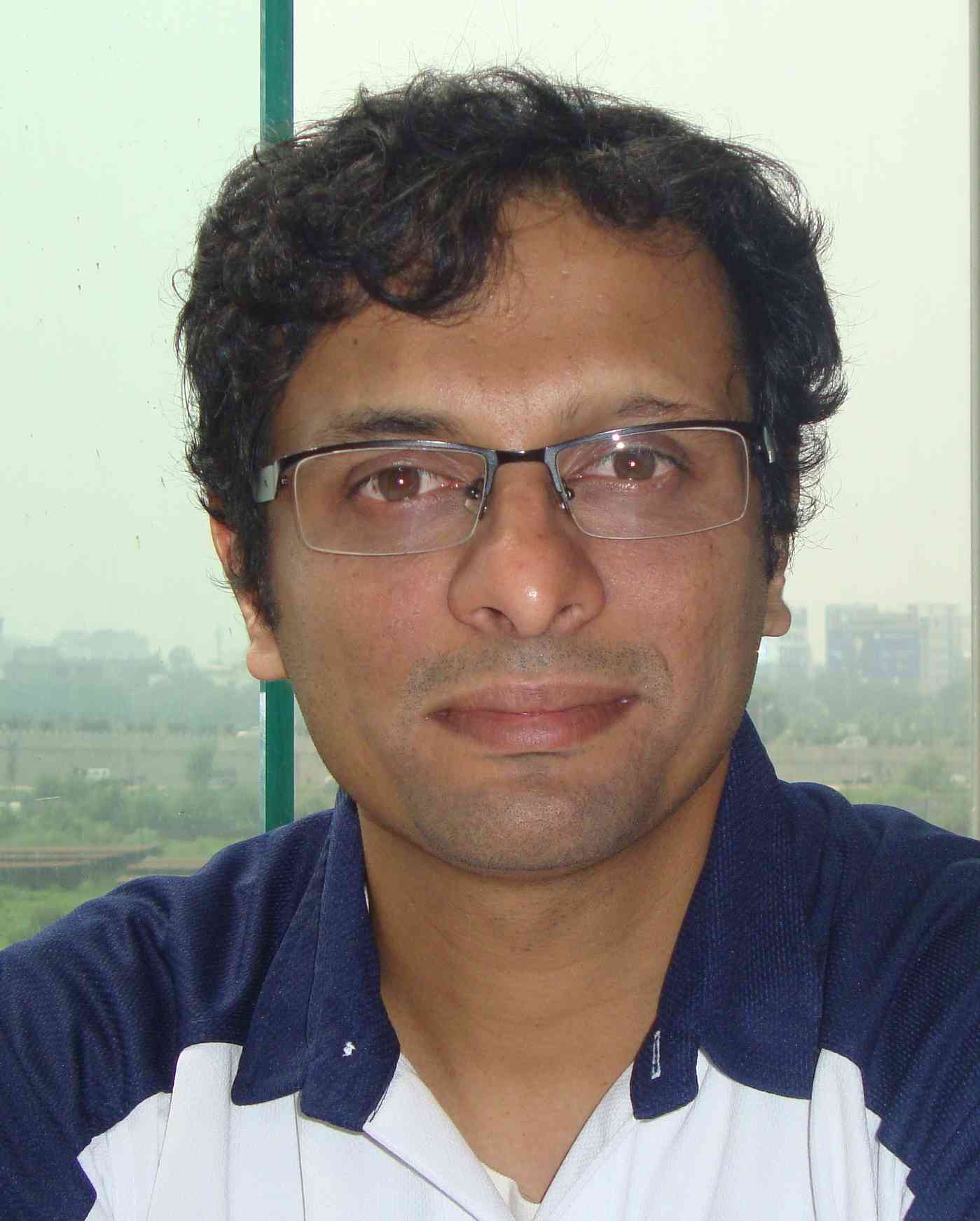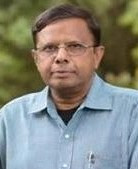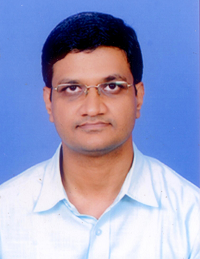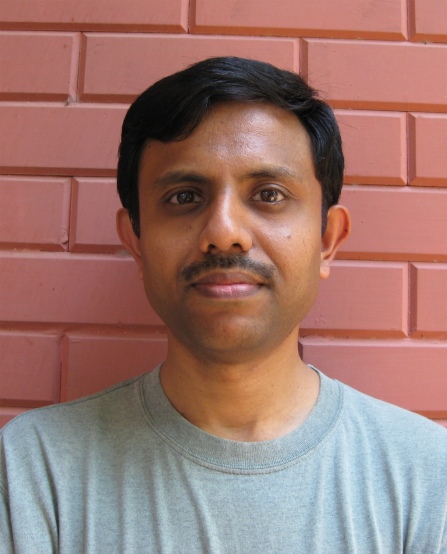
| Prof. Chandra R. Murthy, Department of ECE, IISc, Bangalore
Title: Joint channel estimation and soft-symbol detection in massive MIMO systems with low resolution ADCs Download
Abstract:
In this talk, we present a variational Bayes' algorithm for joint channel estimation and soft symbol decoding in an uplink massive multiple input multiple output (MIMO) receiver with low resolution analog to digital converters (ADCs). The posterior beliefs obtained from the algorithm can be easily used to compute the bit log likelihood ratios, which can be input to a channel decoder. We evaluate the symbol error probability and the normalized mean squared error of the channel estimates of the proposed algorithm using Monte Carlo simulations, and benchmark it against an unquantized variational Bayesian algorithm with perfect and imperfect channel state information (CSI). Also, we empirically show that the perfect CSI assumption that is considered in a few low resolution ADC based massive MIMO papers greatly overestimates the performance of the system. This is joint work with Sai Subramanyam Thoota and Ramesh Annavajjala.
Speaker Biography:
Prof. Chandra R. Murthy is with the Electrical Communication Engineering Department, Indian Institute of Science, Bangalore. His research interests include signal processing, information theory, estimation theory, compressive sensing, and performance analysis and optimization of wireless systems.
|

| Prof. B. Sundar Rajan, Department of ECE, IISc, Bangalore
Title: Coded Caching with Error Correction Download
Abstract:
The high temporal variability of wireless network traffic leads to congestion during peak-traffic times and under-utilization during off-peak times. Coded-Caching is a technique to reduce peak traffic rates by caching (pre-fetching) popular content into memories at the end users during off-peak traffic and using these partly to deliver requested contents during peak-traffic. Using coded cache content and/or coded delivery can lead to enormous caching gains (both local and global caching gains) which has been shown to scale with the size of the network. There are two phases (Placement phase and Delivery phase) in a coded caching scheme. The delivery phase is a collection of index coding problems with common side-information. Most of the works in coded caching assume error-free placement and delivery phases. In this talk we focus on the cases where the two phases are error-prone and discuss error correcting coded caching schemes. This extends the classical error correction coding techniques first to index coding and then further to coded caching schemes. [Joint work with my PhD student MR. Nujoom Karat Sageer].
Speaker Biography:
Dr. B. Sundar Rajan is currently Professor in the Department of Electrical Communication Engineering in IISc Bangalore and was Associate Professor in the Electrical Engineering Department of IIT Delhi from 1989 before joining IISc in 1997. He obtained his M.Tech and PhD degrees in Electrical Engineering from IIT Kanpur, B.Tech degree in Electronics from Madras Institute of Technology and B.Sc. In Mathematics from Madras University.
Dr. Rajan is a Fellow of IEEE, a J.C. Bose National Fellow, Fellow of the Indian National Science Academy (INSA), Fellow of the Indian National Academy of Engineering (INAE), Fellow of the Indian Academy of Sciences (IASc) and Fellow of the National Academy of Sciences, India (NASI). He was an Associate Editor of IEEE Transactions on Information Theory (2008-2011 & 2013-2015), an Editor of IEEE Transactions on Wireless Communications (2007-2011) and an Editor for IEEE Wireless Communications Letters (2011-2016). He served as TPC Co-Chair of the IEEE Information Theory Workshop (ITW'02). Dr. Rajan is a recipient of IEEE Wireless Communications and Networking Conference (WCNC 2011) Best Academic Paper Award, recipient of Prof. Rustum Choksi award by IISc for excellence in research in Engineering in 2009, recipient of Khosla National Award in 2010 from IIT Roorkee and recipient of the IETE Pune Center's S.V.C. Aiya Award for Telecom Education in 2004. His primary research interests include coding for computation, network coding for wired and wireless networks, coding for multi-user communication and signal processing and coding for MIMO wireless systems.
|

| Prof. Srikrishna Bhashyam, Department of EE, IIT Madras
Title: On interference management in the cellular downlink Download
Abstract:
Managing interference is an important aspect of wireless communication network design. Interference management strategies have evolved significantly in cellular networks from interference avoidance in early cellular networks to adaptive interference management techniques. After a brief review of this evolution, we present some results on a distributed interference management scheme for the cellular downlink with limited coordination among base-stations. Here, we consider a multi-cell multi-band downlink where the base-station (BS) in each cell has multiple transmit antennas, and each cell has one active mobile station (MS) with a single receive antenna and treats interference from other cells as noise. There is a sum transmit power constraint for each BS over all the bands. We propose an alternating maximization (AM) algorithm to determine the optimal power allocation among the bands and the optimal beamforming vectors for each BS in each band. This algorithm can be implemented in a distributed manner with limited exchange of interference constraints between the BSs, and only local channel state information at each BS.
Speaker Biography:
Srikrishna Bhashyam received the B.Tech. degree in electronics and communication engineering from IIT Madras, India, in 1996, and the M.S. and Ph.D. degrees in electrical and computer engineering from Rice University, Houston, TX, USA, in 1998 and 2001, respectively. He was a Senior Engineer with Qualcomm, Inc., Campbell, CA, USA, from 2001 to 2003, working on wideband code division multiple access modem design. Since 2003, he has been with IIT Madras. He is currently a Professor with the Department of Electrical Engineering. His research interests include communication and information theory, statistical signal processing, and wireless networks. He served as an Editor of the IEEE Transactions on Wireless Communications during 2009–2014. He is serving as an Editor of the IEEE Transactions on Communications since 2017.
|

| Prof. Neelesh B. Mehta, Department of ECE, IISc, Bangalore
Title: Ordered Transmission Schemes for Energy-Aware Detection in Energy Harvesting Wireless Sensor Networks
Abstract:
Energy harvesting (EH) is a green solution that eliminates the problem of limited lifetime in wireless sensor networks (WSNs). However, the randomness in the energy harvested can cause some EH sensor nodes to be unavailable due to lack of sufficient energy to transmit. This affects the performance of the network and requires a redesign of the protocols for EH WSNs. For the Bayesian detection framework, we propose two novel energy-efficient ordered transmissions schemes for EH WSNs for the general case in which the log-likelihood ratio is bounded and has a continuous distribution function. They markedly reduce the number of nodes that transmit in the network and yet achieve error probabilities that are no more than that of the conventional unordered transmissions scheme, in which all nodes transmit, and sequential detection.
Speaker Biography:
Neelesh B. Mehta is a Professor in the Department of Electrical Communication Engineering at the Indian Institute of Science (IISc), Bangalore. He received his B. Tech. degree from IIT Madras in 1996 and his Masters’ and PhD degrees from the California Institute of Technology, USA in 1997 and 2001, respectively. From 2001 to 2007, he worked in AT&T Research Labs, NJ, USA, Broadcom Corp., NJ, USA, and Mitsubishi Electric Research Labs, MA, USA. His research focuses on wireless communications. He has worked on 3G/4G/5G cellular
communication systems, energy harvesting sensor networks, cognitive radio, cooperative communications, multi-antenna technologies, and multiple access protocols.
He is a Fellow of the IEEE, Indian National Science Academy (INSA), Indian National Academy of Engineering (INAE), and National Academy of
Sciences India (NASI). He is a recipient of the IIT Roorkee’s Khosla National Award in Engineering, Shanti Swarup Bhatnagar Award, Hari Om
Ashram Prerit Vikram Sarabhai Research Award, DST-Swarnajayanti Fellowship, and NASI-Scopus Young Scientist Award. He currently
serves on the Steering Committee of the IEEE Transactions on Wireless Communications and on the IEEE ComSoc Awards committee. He served on
the Executive Editorial Committee of the IEEE Transactions on Wireless Communications during 2014-17 and was its Chair during 2017-18. He
served on the Board of Governors of the IEEE Communications Society from 2012-15.
|